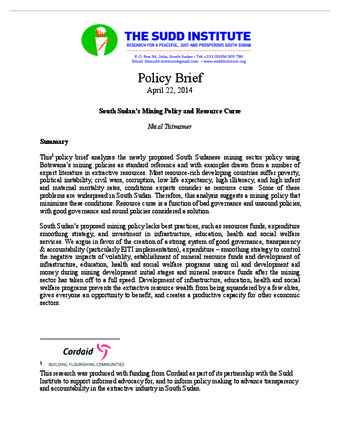South Sudan’s Mining Policy and Resource Curse
Publication Summary
This policy brief analyzes the newly proposed South Sudanese mining sector policy using Botswana’s mining policies as standard reference and with examples drawn from a number of expert literature in extractive resources. Most resource-rich developing countries suffer poverty, political instability, civil wars, corruption, low life expectancy, high illiteracy, and high infant and maternal mortality rates, conditions experts consider as resource curse. Some of these problems are widespread in South Sudan. Therefore, this analysis suggests a mining policy that minimizes these conditions. Resource curse is a function of bad governance and unsound policies, with good governance and sound policies considered a solution.
South Sudan's proposed mining policy lacks best practices, such as resources funds, expenditure smoothing strategy, and investment in infrastructure, education, health and social welfare services. We argue in favor of the creation of a strong system of good governance, transparency & accountability (particularly EITI implementation), expenditure – smoothing strategy to control the negative impacts of volatility, establishment of mineral resource funds and development of infrastructure, education, health and social welfare programs using oil and development aid money during mining development initial stages and mineral resource funds. Development of infrastructure, education, health and social welfare programs prevents the extractive resource wealth from being squandered by a few elites, gives everyone an opportunity to benefit, and creates a productive capacity for other economic sectors.
Nhial Tiitmamer has served as the Director of the Environment and Natural Resources Program at The Sudd Institute where he is currently on leave to work with United Nations in South Sudan (UNMISS). He has served as an Adjunct Assistant Professor at the University of Juba where he has taught Environmental Economics, Natural Resources Economics and Environmental Sociology. Between November 2021 and November 2022, Nhial worked as Senior Environment Associate with the United Nations High Commissioner for Refugees (UNHCR) in Juba. Before returning from Canada in 2013, Nhial worked at Arletta Environmental Consulting in Calgary and at University of Alberta’s Augustana Campus in Camrose in Alberta, Canada. Nhial’s research focusses on natural resources governance, environmental protection, climate change, and sustainable energy. He was awarded in May 2023 by the Board of Directors of The Sudd Institute with Research Impact Award for policy impacts. Nhial holds a B.A. in Environmental Studies with a minor in English Literature from the University of Alberta and an M.Sc. in Sustainable Energy Development from the University of Calgary in Alberta, Canada.

